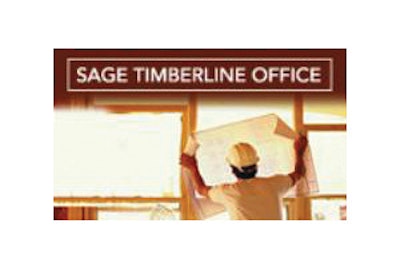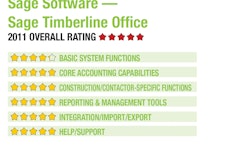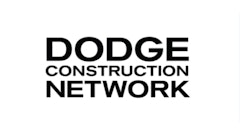
As reviewed by CPA Practice Advisor in March 2012
From the March 2012 Review of Construction & Contractor Accounting Systems.
Best Fit:Sage Timberline Office is best-suited for mid-sized to large contractors and real estate management businesses looking for a scalable solution for residential, commercial, industrial, government and specialty construction enterprises, including heavy construction as well as real estate developers.
Strengths:
- Totally customizable user interface
- Broad user-defined data fields for more comprehensive data tracking
- Powerful estimating module
- New Personal Assistant and Excel-based reporting tools
- Integrates with Sage CRM
- Comprehensive reporting and document management
- Remote time entry for field personnel
- Integrated Project Management
Potential Limitations:
- No SaaS/web-based option (will be debuted in Spring 2012)
- Initial installation and training support is recommended
Sage offers several programs designed for businesses in the construction and real estate development fields, most notably Sage Timberline (available in Enterprise and the Office version reviewed here), and Sage Master Builder. Additional programs include Sage Timberline Estimating, which can be integrated into the previously mentioned programs, providing advanced estimating functions.
Basic System Functions - 5 Stars
Sage Timberline Office is geared toward giving mid-sized and large construction and real estate managers and developers a comprehensive solution for managing the financial and production sides of their entities. The system opens into a very attractive and easy-to-use interface that provides extensive user customization options. The system is available with a variety of modules based on the type of construction entity, with the core accounting desktop displaying a vertical menu for accessing the other modules, reporting, inquiries and online resources. Users can tailor the interface to their needs and can also customize screens to include links to functions and external websites. The drag and drop customization options are very user friendly and further aid in user productivity.
A detailed and expandable tasks menu offers a folder-based view that lets users jump to modules and specific functions, while dashboard views of key business data are available for each of the core areas of the business, such as receivables, budgeting, job cost, project management, property management, service management and more than a dozen other areas.
Sage Timberline Office can be used as a stand-alone program or networked across all users within a firm. It is built on the Microsoft .NET platform and offers multi-location support, as well as offering remote access tools and mobile apps.
Core Accounting Capabilities - 5 Stars
The core accounting module in Sage Timberline Office includes full GL, AR, AP, job costing, equipment costing, billing and payroll, as well as offering remote time and data entry, allowing users to enter information from the worksite. The GL offers 25-character fields for account IDs, and enables the management and tracking of multiple, separate or interconnected companies, with divisions, departments and other sub-entities. Other account tracking functions include tracking debit activity, up to 250 user-defined data fields for additional information, tracking of joint venture ownership percentages and restriction of GL accounts to specific modules.
The program's accounts receivable module offers detailed customer tracking, including credit limits, ratings and histories, default billing information, tax exemption status and certificates, customer contact information, correspondence logs that track memos, letters and other interaction, and the ability to link such correspondence to customers, contracts, contract items, change orders, invoices, jobs, cost codes, cash receipts or other items. The AR also has extensive aging management tools. Payables functions also offer the same extensive tracking of vendors and subcontractors as the AR module does for customers. Other optional accounting-focused modules include job costing, billing, equipment costing (including depreciation), full payroll and remote time entry, which can be used to enter time and distribute it to multiple jobs, cost codes, categories, pay IDs or other factors. A timesheet approval system can also be used, allowing managers and accounting to monitor, change and approve entries as necessary. A built-in, full-time audit trail and task-specific security functions at the user level help ensure data integrity and access only to authorized users.
Construction/Contractor-Specific Features - 4.75 Stars
The construction and property management modules available with Sage Timberline Office depend upon the nature of the construction business. The program can be set up to manage firms in commercial/industrial, residential and electrical/mechanical contracting and construction, or specialty and service contractors, real estate developers and managers, corporate or government property owners, and heavy highway construction firms. For residential builders, the key construction modules include estimating, production management, document management and property management.
Recently added features include a new personal assistant tool, which can monitor critical project and property information and delivers automatic alerts about profit, compliance and a broad range of key activities, and the Sage Timberline Office Connector, a business intelligence tool that lets users query, report and move data back and forth between Excel and Timberline Office.
Sage Timberline Estimating offers tools for automating many processes. The estimating spreadsheet system offers a customizable interface that shows all related factors, including easily sortable columnar data for takeoff quantity, labor productivity, labor quantity, and prices, material costs, and other information, with the spreadsheets linked to several extensive databases. Users can do quick takeoffs, adding items to estimates individually, or use assembly/group-based takeoffs or model takeoffs to start an entire project based on templates. More detailed information on Timberline Estimating is at www.sagetimberlineestimating.com/Solutions.
The program's Desktop and Job Central console offers a centralized location for job setup and management, including estimates and billing, with the ability to drill down to job components, materials, parts, labor and related documents. The change management functions give users tools for tracking contract changes, and also includes customer and in-house approval routing processes.
The payroll module in Sage Timberline Office supports all states, multi-state employees and allows unlimited deductions including garnishments, insurance and retirement programs, and other third party pay. The module includes utilities for managing union payrolls, tax reciprocity, certified payrolls and workers' compensation, with the ability to run payrolls on any frequency. Customer, vendor, employee and subcontractor management screens offer extensive detail and drill down to histories and credit limits, as applicable, as well as reporting functions.
The inventory module tracks items in a shared database with purchasing, helping to consolidate the functions and streamline inventory reordering. It supports LIFO, FIFO, last cost, standard and average cost methods. For scheduling and dispatch functions, the program can be used to manage up to 50 technicians, each of whom can remotely access customer and project billing and service histories, and can receive work orders wirelessly while in the field. Equipment cost and service management functions help track asset and vehicle usage, as well as rental information, license and insurance expiration dates, warranties and user-defined information.
Reporting & Management Tools - 4.75 Stars
Sage Timberline Office has a library of more than 500 customizable reports covering both business accounting information and project management, and the system includes a financial statement designer that can be used to create standard and custom sets of financials. The program also offers integration with Crystal Reports.
Job costing reports include committed cost details, completion trends, the change order log, WIPS and other AIA-compliant output. Templates are available based on business type and industry language and are also available for customer communications. Document management functions include the ability to store all project-related items with the job, keeping various documents, correspondence, invoices, blueprints, images and specs organized.
The program offers a remote time entry feature for employees in the field to enter time and job data, as well as a remote dispatch scheduling utility. The company recently debuted two new reporting and management tools, Sage Timberline Office Connector, a business intelligence tool that lets users search and report and move data back and forth between Excel and Timberline, and Sage Timberline MyAssistant which proactively monitors data and delivers automatic alerts about business critical information requiring action. The Sage Desktop offers dashboarding management and reporting capabilities with the ability to drill down to job components, materials, parts, labor and related documents
Integration/Import/Export - 5 Stars
Each of the standard and optional modules in Sage Timberline Office integrates seamlessly, and the program also integrates with Sage CRM and can import data from Excel. Integration with Crystal Reports is also offered.
Help/Support - 5 Stars
The program's built-in support and help features include context and task-specific help, how-tos and tips, along with links to online sources. The Sage support site is based on customized user portals that give access to product downloads and documentation, knowledgebases, contact information, a user community and training options. Premium support services are available via subscription pricing, as well as through Sage's network of consultants and the Sage Accountants Network. All support staff for U.S. users are based in the U.S.
Summary
Sage Timberline Office is one of the premier construction management systems on the market, providing an exceptional user interface and customization capabilities, with powerful database-driven estimating features, powerful job costing, exceptional reporting and very strong business management and accounting tools. Program pricing varies based on the specific module set and user base for each firm, with investments starting around $10,000 on average.
2012 Overall Rating: 5 Stars

















